As the mezcal market becomes saturated with well-strength espadín, many producers are exploring an additional step in their mezcal-making process. This could be ageing, infusion, or distilling with other elements to add another layer of flavor. The idea of “flavored mezcal” may raise alarm bells, such as the question of additives or overpowering the agave. However, what I am referring to here is mezcal with natural elements added during distillation. These spirits can offer a playful, creative take on traditional mezcal that serves well in cocktails and sipped neat.
Pechuga–the original “flavored” mezcal
A traditional mezcal with added natural flavors is mezcal de pechuga. This famously includes a protein in the distillation process. The protein (usually chicken or turkey) is suspended in the montera, while fruits and spices are added to liquid in the pot below. Pechugas may be made with seasonal fruits, or for specific celebrations such as the Christmas holidays.
Symbolically, the use of the pechuga is a sacrifice and an offering, which connects this practice back to pre-Hispanic times, when sacrifices were made to give thanks. Pechugas are often distilled after Dia de los Muertos, using items from the family altar. The unique recipe is based on what they have on their altar. Rolando Cortes, of Casa Cortes mezcal, explains: “Mezcal de pechuga is something that comes from the heart, from the bosom of a family.”
In our interview for Mezcalistas, Rolando said that, to begin with, their pechugas were only to share, not sold. But he eventually added a pechuga to the Casa Cortes range. Recently, many more brands are exporting a pechuga as part of their selection.
Other producers are experimenting with unconventional proteins. Del Maguey brought an iberico ham pechuga, while Rambha has a sought-after pechuga with langosta (lobster) added in stages during the distillation for a delicious briny note. Gracias a Dios has also experimented with seafood, collaborating with chef Javier Plascencia to producea a series of limited edition pechugas.
This sort of small batch, limited edition agave spirit is one of the trends Mezcalistas contributer Tess Rose predicted for 2025. “Strategic partnerships between people and establishments that are seen as agave demagogues is a new way of moving volume and creating brand recognition–it’s a win-win for both the influencing party and the brand. Sometimes it’s a win for the consumers ”
What does destilado con mean on a mezcal bottle?
Under the official categories, pechuga mezcals are classified as “Destilado con.” But other mezcals in this category aren’t distilled with a suspended protein.
General “Destilado con” mezcals are usually made by taking either ordinario or a twice-distilled batch of agave spirit, and then running this through the still again with the addition of other elements such as citrus fruits, herbs, coffee beans, or even mole paste.
The first destilado-con I ever tried was the espadín distilled with coffee beans made by Celso Martinez, from mezcal La Jicarita. This was late 2014, around a year into my mezcal journey, and I hadn’t tried anything like it. Beforehand, I was apprehensive–preparing myself for something sickly sweet. Fortunately, the spirit Celso handed me was fresh and elegant; the nutty coffee on the nose lightly influenced the agave flavor without overpowering it.
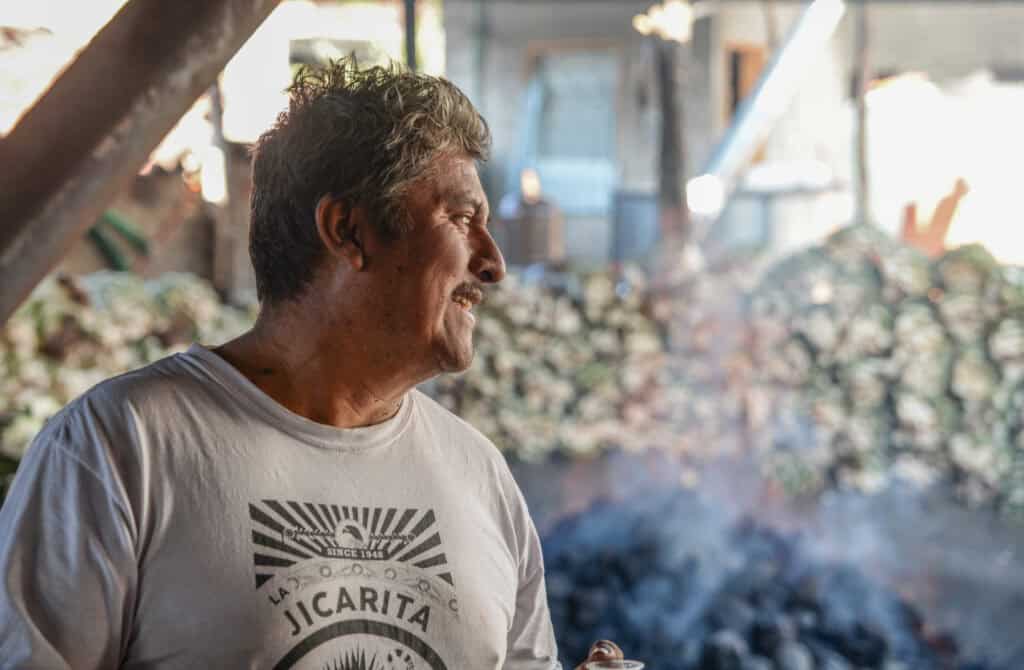
Since then, I have continued to visit Celso and his family regularly, seeing his kids grow up and taking on their own production roles in mezcal. I have also got to try the extensive range of mezcals from La Jicarita. Most of these you can only try onsite in their palenque or buy in a simple bottle with their signature white label.
What stood out to me was the level of experimentation that Celso employed in his mezcal. Although I see this more often in recent years, Celso was the first mezclero I saw using a mini still to try out adding different ingredients. As well as a classic citrusy pechuga, he has explored using herbs, flowers, and fruits. A favorite of mine he distilled with peanuts, and he was the first mezcalero I met who was using marigold, a big hit with bartenders I have brought to visit.
Fred Baptista and Frijolotes put “flavored mezcal” front and center
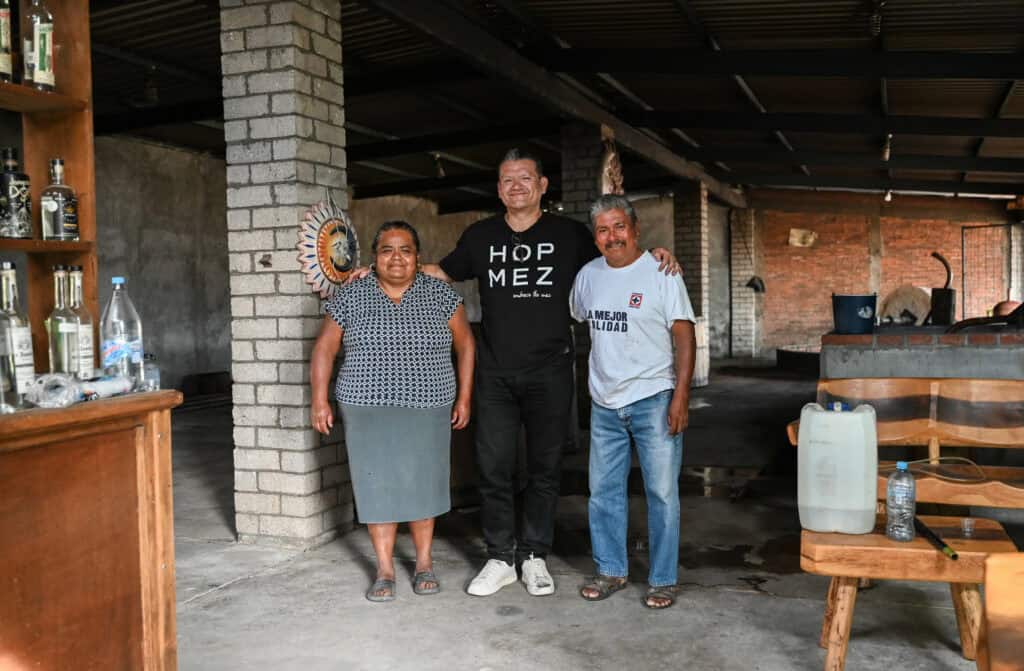
At a 2018 fiesta at the Jicarita palenque, I was introduced to Fred Baptista. He was visiting Celso to work on plans to introduce La Jicarita to a wider audience through his import business, Frijolotes LLC. He was also spending some time with Celso and his son Guillermo working on a beer they were brewing at the palenque with hops Fred had driven down from California.
Fred’s journey into mezcal is marked by a blend of personal passion, accidental discoveries, and strategic business decisions. A casual interest in mezcal evolved into the co-founding of a liquor import business and the creation of a unique mezcal product.
Frijolotes is a passion-led business that celebrates small-batch mezcals, with a focus on unusual expressions, including small-batch sylvestres and destilados-con from La Jicarita, Mezcal Salvadores, and Mezcalogo, as well as Fred’s own recipe for a hops-distilled agave spirit: Hop Mez, which he makes with Jicarita mezcalero Don Celso.
Fred was born in El Salvador, but immigrated to the Bay Area (Alameda, California) as a child. In 2006, he embarked on his dream road trip back down to El Salvador. During this trip, he drove through Mexico, where he first encountered mezcal. With university friend Young Yung, Fred devised Frijolotes, launching the project in 2017.
Their objective was to identify a small-batch mezcalero to introduce a distinctive mezcal to the Bay Area, yet still at a price point and strength that could work for cocktails. During his research, Fred read about mezcal de pechuga, and it captured his imagination. He was fascinated by the ritual, tradition, and layers of flavor, which motivated him to pursue a pechuga for his flagship product. This unusual decision for a starting mezcal is a precursor to the niche, small-batch selection Fred has pursued over the years.
In 2017, Fred flew back to Oaxaca and made his way to Santiago de Matatlan, the self-proclaimed “world capital of mezcal.” After visiting multiple producers in his search for a great pechuga, a lady in the town center recommended Palenque La Jicarita. There Fred met Señora Lorena, Celso’s wife. After tasting the mezcals, he knew he had found the pechuga he was looking for.
Choosing a pechuga as their first product on the market came with its challenges. The TTB (Alcohol and Tobacco Tax and Trade Bureau) approval process for pechuga was particularly challenging. It required a “formula” for the additional elements to be on the label. (This isn’t normally needed with mezcal if it’s pure agave.)
Pechuga recipes are closely guarded by producers who are protecting their methods and personal, family traditions. Fortunately, Celso and Fred were able to come to an agreement over a general formula for the export label. Although the brand and liquid belong to Celso, Fred had a label designed for export, which is exclusive to Frijolotes for a ten-year period. After this, Celso has the option to sell using this label to whomever he chooses.
The process took months as submissions were repeatedly rejected. This led to a backup plan to launch a Jicarita Sierra Negra expression. Both eventually received approval and landed in the US simultaneously. The silver lining is that this experience provided valuable knowledge for navigating TTB regulations. This has helped Fred develop a varied portfolio for Frijolotes; he has also become a generous source of information for new brands exploring mezcal imports.
The first goal with Frijolotes was to get to 100 accounts and then start looking for a distributor. They got to 180 accounts, but never found a distributor that was a good fit. Fortunately, Fred fell in love with self-distribution. “Walking through the service door with a box of mezcal and shooting the shit with the staff for a few minutes still feels great.”
In 2020, during the initial wave of the pandemic, when many small brands and importers disappeared from the market (often leaving producers in the lurch), Fred decided to double down. He began to explore making his own “destilado-con”–with Celso and Lorena’s guidance, of course.
Having already developed a palate for mezcal throughout his life and through his relationship with Celso, Baptista was inspired to combine the two worlds. He decided to experiment with making a mezcal that stemmed from his love of beers and home brewing.
Fred remembers that he began the process by putting hops in a coffee cone and pouring mezcal through it. Then they conducted trials at Celso’s palenque using a small 20-liter test batch system, distilling Centennial hops that Fred brought from California, with espadín agave during the third distillation. Lorena and Celso were key experts in making Fred’s dream a reality, with Lorena playing a significant part in strategizing the recipe.
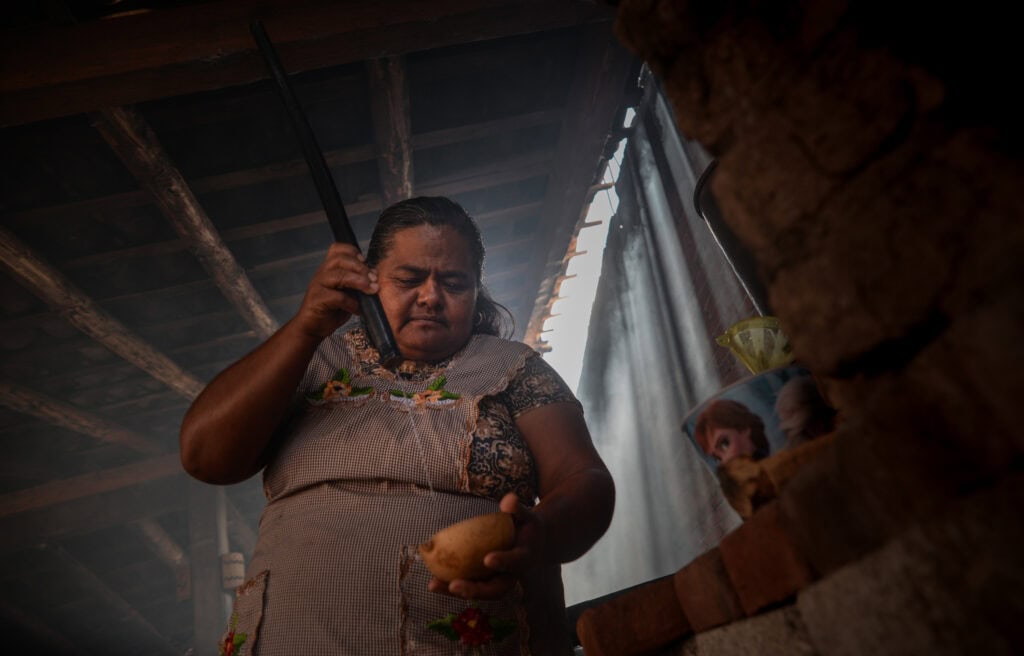
Fred did a lot of blind tests with friends and family. Although he loved the spirit at 55%, overall, he decided to bring it down to the current profile at 40% to make it more approachable.
Hop Mez is designed for a session of drinking; picture a shot of mezcal with a cold beer on a hot day in Oaxaca or Oakland. Drinking mezcal and beer together is a classic combination. If you have spent time in an Oaxacan Cantina, stacks of mezcal glasses and empty beer bottles sit on the edge of tables, alerting the barmen to how much has been consumed.
With Hop Mez, Fred’s target market is beer drinkers and those who combine mezcal with beer. He describes it as offering a different kind of introduction to mezcal from your classic espadín, “without stepping on the toes of traditional mezcaleros.” Recent events like the Agave Beer festival in California are the perfect platform for Hop Mez.
Celso’s experience using a wide variety of botanicals in his distillation process, combined with Fred’s passion for beer and mezcal has resulted in the genuine collaboration that is Hop Mez. The slightly musty hops are present without overpowering the sweet flavor of espadin agave. “It seemed like a natural stage with my interest in beer and mezcal, having been around all of it and how they’re both made,” Fred explains.
Through a combination of a solid concept with Fred’s infectious enthusiasm and energy, Hop Mez was brought to market in July 2022. Highlights include being picked up by New York’s Regal Wines and winning double gold at the San Francisco Spirit Competition.
Despite finding a calling in his work, as a nano importer (selling approximately 3000 bottles per year), it can be a challenge. “I’m shipment to shipment. It’s always been the reality that I have to sell to rebuy from Mexico.”
He says, “I feel a huge responsibility to continue the development of the brand.” However, it’s a lot of work to balance responsibilities in Mexico with the requirements to make an export product successful. “It’s two worlds, the production world in Mexico. And then there are the accounts and having to distribute and represent a brand.” He remembers: “The first three years are non-stop. I mean, everything is a mini crisis on every turn…”
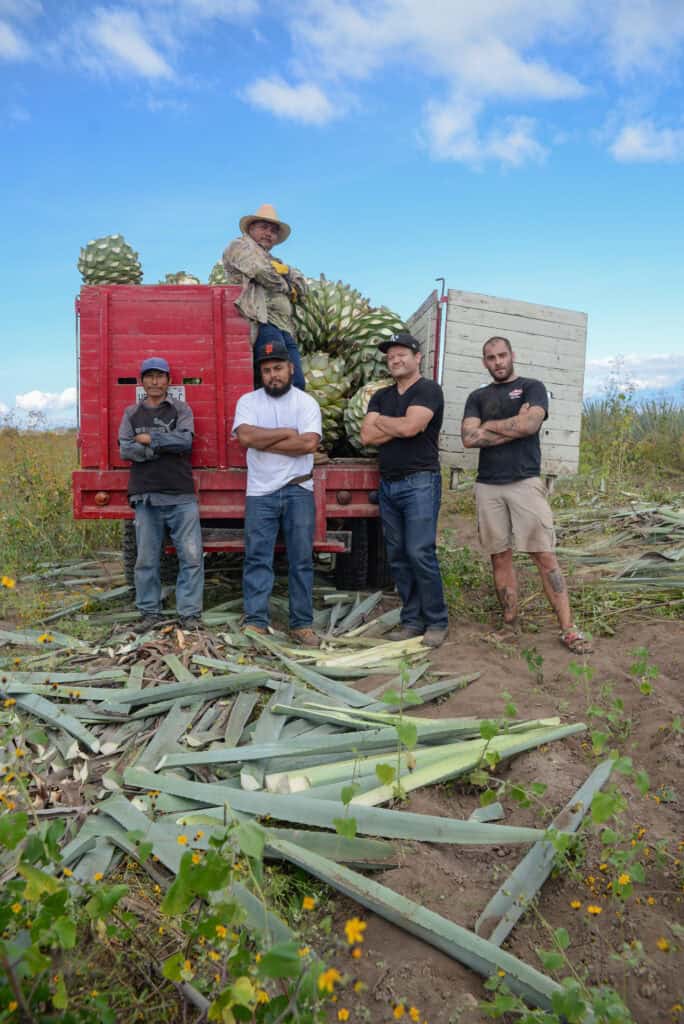
Going forward with Frijolotes, Fred looks to pursue a larger range of small batch expressions, showcasing the limited batches. He describes this as the “Del Maguey model,” with a long list of offerings.
Fred aims to expand the range for Hop Mez with different hop varieties, as well as continuing to spotlight the creative methods of Celso, Salvadores Mezcal, and more. He explains this was not possible in the beginning, due to a minimum purchase order he had with Celso. Now things are more flexible, and he is also able to mix and match varieties in a single pallet.
Although he is starting some new relationships with other brands, Fred says, “The game has changed. It’s pretty awesome helping someone you know get to the market. But it’s going to be at a very small scale.”
La Jicarita (pechuga) has been his flagship mezcal, accounting for 80% of sales in the first three years and “keeping them in the game.” Referring to the relationship with La Jicarita and Celso, Fred says the bottom line is “leaving the brand in a good place with something the family can manage on their own. If there is a massive downturn, this might be my last hurrah.”
Since I first met Fred at La Jicarita, I have spoken to numerous brands and producers who have referred to him, specifically for his advice. “I don’t consider myself an expert, but if someone asks for advice, why not? I know the road I’ve travelled really well and the pitfalls along the way,” he says. Few entrepreneurs are open to sharing all their hard-won experience, so it’s heart-warming to hear how selflessly Fred extends a hand to people trying to learn in this competitive business.
The intersection of trends and tradition
As the mezcal market continues to grow, new consumer trends come to light. These, in turn, get passed back to the producers. This is one way to look at the “destilado-con” category, and it is worth being cautious of large-scale producers jumping on the band wagon. However, there is no denying the ritual importance of pechugas, or the authentic ingenuity displayed in the diverse spirits made by producers like Celso Martinez. Fred and Frijollotes offer a collection of brands that help consumers connect with producers like Celso who both celebrate tradition and pursue innovation in their mezcals.

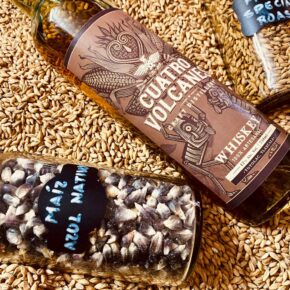
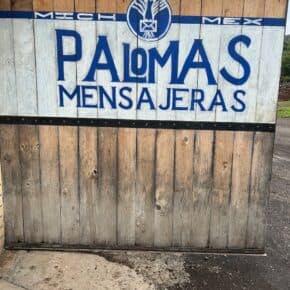
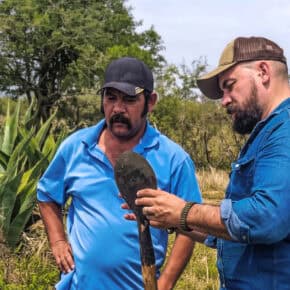
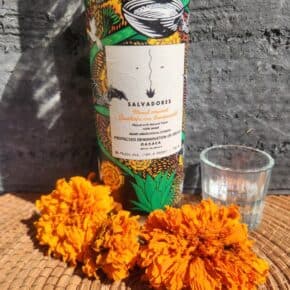







Leave a Comment